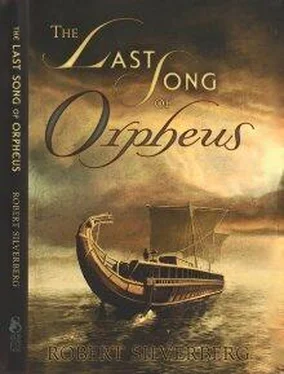Well, I had sung three-headed Cerberus into pleasant slumber, and I had soothed the serpent guardian of the Fleece the same way, and now I took lyre in hand to get us past this peril as well, for I knew that other tasks awaited me beyond this voyage and we were not destined to end our days here.
These Sirens are my cousins, daughters of my mother’s sister Terpsichore the muse. Their voices are clear and beautiful, and when travelworn seamen pass their island they sing out in chorus, beckoning them ashore to supposed delights, but actually intending their deaths. They offer soft bosoms and a warm resting-place to weary travelers, and few can say no to them.
But I know a little about the art of song myself; and as the Sirens began their lovely song, I cut across it with a rousing chanty of my own that entirely canceled out their alluring harmonies, breaking over them and engulfing them in robust manly rhythms. I sang to the oarsmen of all that we had endured, and all that we had achieved, and of how close we were now to home and the glory that awaited us upon our return. My song lifted their spirits, and, exhausted and famished though they were, they pulled hard at their oars, and the Sirens were powerless to make themselves heard above my voice and the steady thrumming of my lyre. Only one of our number, young Butes of Iolcus, was able to tune his ear to their song instead of mine, and leaped overboard and swam on toward shore, where those devilish sisters pounced upon him in the surf.
To Sicily then we came, King Alcinous’ realm. There we were met with a welcoming feast. But even as we rejoiced in this comfort after our hard voyage, dark sails appeared off shore: yet another fleet of Colchis, sent out by Aietes to rove the seas in search of Medea and the Fleece. Of course they could not attack us while we were Alcinous’ guests; but the Colchian envoy who went before the king accused us of theft and worse, and asked Alcinous to turn over to them all that we had stolen from their king. And Alcinous, fearing to make an enemy of Aietes and unwilling also to bring the wrath of thundering Zeus upon himself, showed a willingness to do so.
Jason was unable to refute these accusations, and was helpless and baffled here. But Medea stood up boldly before the king and begged for mercy from him, pleading with him not to separate her from Jason, whom the gods had destined for her as her mate. Surely, she said, her father, who had never loved her and now looked upon her as a traitor, would put her to death if she were brought back to Colchis. Did Alcinous, that wise and generous king, mean to send a guest of his household to such a death?
Alcinous was moved by her tender words, just as Jason, earlier, had been swayed by her angry ones. The king declared that if she was still a virgin, he would indeed send her back to Aietes, for Aietes had a father’s right to her and Jason had none at all. But if Medea and Jason were married, he would not come between a husband and his wife. That night we poured the wine and honey for the gods, and sacrificed the sheep, and built a wedding bed for Jason and Medea with the Golden Fleece spread upon it as a coverlet; and so, in haste, their marriage was consummated in this foreign land instead of in Jason’s father’s house in Iolcus, as he had intended. It may have been a happy night for them but there would be little happiness for these two in the years ahead.
Concerning the remainder of our long time of tribulations I will be brief. When we left Sicily we were caught by a northerly gale and blown toward sun-parched Africa, into the Gulf of Libya, where our ship was caught by one of the wild tides of that place and carried far up onto the desert shore. Ancaeus the helmsman gave way to grief at this; for not only were we beached, but he knew that when the tide returned it would sweep us just as irresistibly out upon the rocky shoals that rose everywhere in this desolate place, and our hull would be shattered beyond hope of repair. So there was no alternative for us but to take the terrible weight of the Argo upon our backs, lifting the ship and hauling it across the desert, day after brutal day, an effort that very nearly was beyond our ability. At last, just as we were coming to the last of our endurance, we reached navigable waters beyond. No suffering in all the time since we had first set out was equal to the suffering that this portage imposed on us; and we were weeping tears of blood by the time we staggered at last to the brink of a brackish lake and put the Argo ’s keel into water once more.
To the open sea we sailed, and thence to Crete, and by one way and another we made our way homeward. You will know that Jason took the Fleece and his bride to Pasagae, where there was great rejoicing. Even King Pelias, he who had sent Jason on the long quest, pretended to be pleased at his return with the Fleece. Old Aeson, Jason’s father, had died during his absence. Medea, who by then was with child by Jason, charmed Pelias into believing that she could through her witchcraft make him young again, but that monstrous woman gave him poison instead of some magic elixir, so that he perished in a terrible way and Jason became king in Iolcus. After which, as you know, he strayed from Medea in his affections, embracing Glauce, the daughter of the Theban king; but fierce vengeful Medea slew not only Glauce but her own two young children, leaving only their corpses for Jason, and fled from Thessaly to many other dark exploits elsewhere, of which I need not sing here. And the last years of splendid Jason were blackened by grief and shame.
As for me, I left the Argo in the Peloponnese and undertook a pilgrimage to Hades’ gate at Tainaron, that place where I had parted forever from my Eurydice. A commandment had been laid upon me to offer up a ceremony of thanksgiving there to the gods for my safe return, which I duly performed, asking no questions. And then finally I went back to Thrace, where the gods meant me to resume my responsibilities as a teacher and a leader, and eventually to meet my doom.
I dwelled in Thrace for a good many years, then, continuing the work among the harsh and rude Ciconians that I had begun before Cheiron summoned me off to the voyage for the Fleece, and I achieved much that was useful in bringing them toward civilization. Not that I remained there constantly, for an oracle I had consulted had warned me that a kind of restlessness would overcome me from time to time and, with nothing more than my lyre and the sack upon my back, I must get myself off to some distant land and take part in whatever sacred Mysteries were celebrated there. Such journeys were all part of my task. To fulfill my role in maintaining the great harmony of the universe I must go from place to place as I am told, either to teach or just to sing and play, as is needed.
During one of these absences the great war broke out between Hellas and Troy. I need not sing that tale here, the story of Agamemnon and Menelaus and Helen and Paris and Achilles and Hector and all the rest, for others have sung it as well as any mortal ever could. When all that was happening I was far away, visiting Egypt once more—a new Pharaoh ruled there now, a shriveled, fleshless boy whose soul was as dry as the desert sounds of his kingdom. He showed no sign of mortal emotion whatever and wore his double crown like the aegis of a god. This king wanted none of my songs and would have sent me away, though after a time he relented and let me stay, and even had me shown into the richly painted underground chamber where the Pharaoh whom I had known now lay buried amid all his lavish treasures.
Pharaoh’s priests shared much arcane wisdom with me, and I stayed with them for several years, to my great benefit, until finally an inner voice told me it was time to go, that the course of my destiny would now take me elsewhere. So back I went to rugged mountain-girt Thrace again. There I learned that while I was still in Egypt, renewing my studies in the lore of that ancient land, the war at Troy had ended and Odysseus of Ithaca, the wily son of my old Argo shipmate Laertes, had put ashore at my capital city of Ismarus in the early days of his long voyage home. And Odysseus had let his men sack the place, so that I found much of it wrecked upon my return.
Читать дальше












